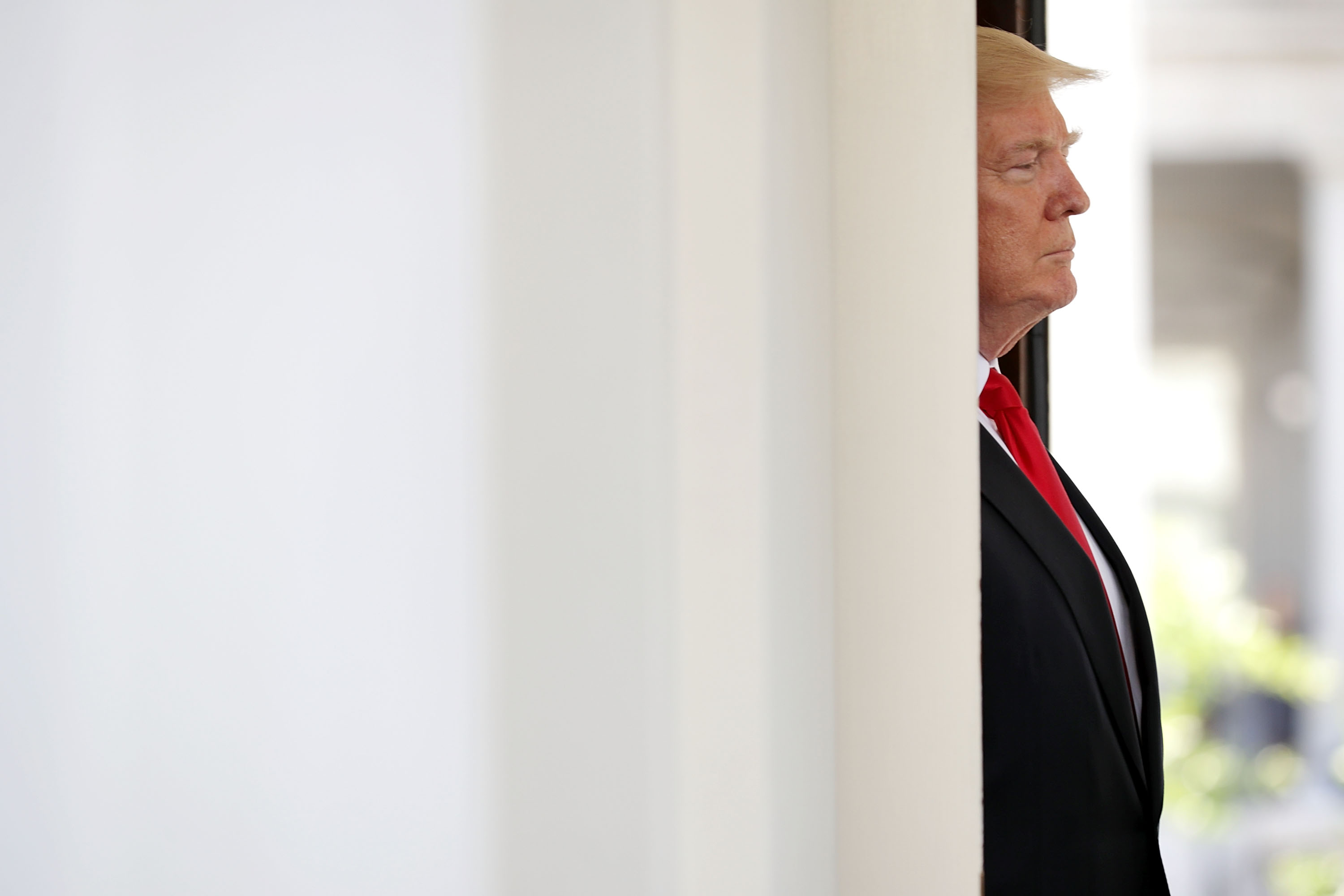The Godfather in the White House
Trump is running the government like a sort of low-rent mafioso, and nurturing institutional rot as a result


A free daily email with the biggest news stories of the day – and the best features from TheWeek.com
You are now subscribed
Your newsletter sign-up was successful
The prepared testimony former FBI Director James Comey provided to the Senate Select Committee on Intelligence ahead of his hearing today is an altogether remarkable document. It confirms much of the scandalous and anonymously sourced reporting that emerged from Donald Trump's abrupt dismissal of Comey, and it reveals a president who is thoroughly consumed by the scandals plaguing his still-young administration. But more importantly, it portrays a sitting president of the United States who conducts business like a sort of low-rent mafioso.
According to Comey's narrative, President Trump invited him to a private dinner shortly after the inauguration, where Trump asked Comey if he wanted to remain FBI director. After Comey said he intended to stay, Trump purportedly told him: "I need loyalty. I expect loyalty." At their next one-on-one meeting, held in the Oval Office the day after Trump fired National Security Adviser Michael Flynn, Trump allegedly pressured Comey to drop the FBI's investigation into Flynn. "He is a good guy and has been through a lot," Trump said, per Comey's testimony. "I hope you can see your way clear to letting this go, to letting Flynn go. He is a good guy. I hope you can let this go."
A month later, Trump phoned Comey to talk about the FBI's investigation into Russian hacking of the 2016 election, calling it a "cloud" over his presidency and asking what Comey could do to "lift the cloud." One month after that, Trump called Comey again to complain about the "cloud" and he returned to the topic of loyalty. "I have been very loyal to you, very loyal," Comey says Trump told him, adding cryptically: "We had that thing you know." Less than a month after that, Trump fired Comey.
The Week
Escape your echo chamber. Get the facts behind the news, plus analysis from multiple perspectives.

Sign up for The Week's Free Newsletters
From our morning news briefing to a weekly Good News Newsletter, get the best of The Week delivered directly to your inbox.
From our morning news briefing to a weekly Good News Newsletter, get the best of The Week delivered directly to your inbox.
What this tells us is that Trump's view of government is rooted firmly in patronage and profound contempt for the idea that the president is bound by laws. Public servants are expected to show fealty to the Constitution, and they take an oath to that effect. Serving under Trump, however, means serving Trump and doing whatever he asks out of fealty and respect.
Comey's testimony sketches out repeated and flagrant abuses of authority by Trump that warrant aggressive investigation. He tried unsuccessfully to get the FBI director in his pocket with poorly disguised threats centering on "loyalty," and then applied pressure on Comey to influence Justice Department investigations that were politically troublesome. After Comey withheld his loyalty and refused to meet Trump's demands on Russia and Flynn, he was sacked. (We don't have to guess that Trump fired Comey over the Russia investigation because he said as much on national television.)
For the moment we can set aside the question of whether Trump actually obstructed justice, given that Republicans in Congress need Trump to pass their agenda and won't make any effort to check his abuses, no matter how well they are documented. But the longer Trump is given a free hand to treat the government he runs as loyalty-driven syndicate, the more damage he'll do to our governing institutions.
By making "loyalty" an overriding requirement for service in the executive branch, Trump is ensuring that the only people who will seek out and succeed in public service are strivers and toadies. Trump's erratic behavior and constellation of scandals have already made it damn near impossible to find competent recruits for key administration jobs that remain vacant. Trump even had difficulty finding outside counsel to represent him in the Russia investigations, as top law firms worried that he would disregard their advice and stiff them on the bill. The sort of person who would happily sign up with a turmoil-ridden executive branch that requires slavish loyalty to the president very likely doesn't have the public's interest foremost in their mind.
A free daily email with the biggest news stories of the day – and the best features from TheWeek.com
The flip side to this poisonous dynamic is that good, competent public servants who value their oath to the Constitution over loyalty to the president will eventually make for the exits. The behaviors described by James Comey in his testimony should have every executive branch employee who isn't already in Trump's thrall worried that they'll one day have to choose between their jobs and the demands of an autocratic chief executive.
And, of course, everyone who comes up for a high-level position within the administration will automatically come under suspicion. The release of Comey's testimony was preceded by Trump's announcement that he'll nominate attorney Christopher Wray to lead the FBI. Why shouldn't we assume that Wray was asked to kiss Trump's ring? What assurance can we have the Wray didn't promise loyalty to Trump as a precondition for his nomination? Democratic senators will undoubtedly ask Wray these questions at his confirmation hearing, but why would anyone expect him to own up to swearing allegiance to Trump?
By running the government like a small-time gangster outfit, Trump is nurturing institutional rot and making it impossible to assume that high-level executive branch employees are operating in good faith.
Simon Maloy is a political writer and researcher in Washington, DC. His work has been published by The Huffington Post, The American Prospect, and Salon.
-
 Can Europe regain its digital sovereignty?
Can Europe regain its digital sovereignty?Today’s Big Question EU is trying to reduce reliance on US Big Tech and cloud computing in face of hostile Donald Trump, but lack of comparable alternatives remains a worry
-
 The Mandelson files: Labour Svengali’s parting gift to Starmer
The Mandelson files: Labour Svengali’s parting gift to StarmerThe Explainer Texts and emails about Mandelson’s appointment as US ambassador could fuel biggest political scandal ‘for a generation’
-
 Magazine printables - February 13, 2026
Magazine printables - February 13, 2026Puzzle and Quizzes Magazine printables - February 13, 2026
-
 The billionaires’ wealth tax: a catastrophe for California?
The billionaires’ wealth tax: a catastrophe for California?Talking Point Peter Thiel and Larry Page preparing to change state residency
-
 Bari Weiss’ ‘60 Minutes’ scandal is about more than one report
Bari Weiss’ ‘60 Minutes’ scandal is about more than one reportIN THE SPOTLIGHT By blocking an approved segment on a controversial prison holding US deportees in El Salvador, the editor-in-chief of CBS News has become the main story
-
 Has Zohran Mamdani shown the Democrats how to win again?
Has Zohran Mamdani shown the Democrats how to win again?Today’s Big Question New York City mayoral election touted as victory for left-wing populists but moderate centrist wins elsewhere present more complex path for Democratic Party
-
 Millions turn out for anti-Trump ‘No Kings’ rallies
Millions turn out for anti-Trump ‘No Kings’ ralliesSpeed Read An estimated 7 million people participated, 2 million more than at the first ‘No Kings’ protest in June
-
 Ghislaine Maxwell: angling for a Trump pardon
Ghislaine Maxwell: angling for a Trump pardonTalking Point Convicted sex trafficker's testimony could shed new light on president's links to Jeffrey Epstein
-
 The last words and final moments of 40 presidents
The last words and final moments of 40 presidentsThe Explainer Some are eloquent quotes worthy of the holders of the highest office in the nation, and others... aren't
-
 The JFK files: the truth at last?
The JFK files: the truth at last?In The Spotlight More than 64,000 previously classified documents relating the 1963 assassination of John F. Kennedy have been released by the Trump administration
-
 'Seriously, not literally': how should the world take Donald Trump?
'Seriously, not literally': how should the world take Donald Trump?Today's big question White House rhetoric and reality look likely to become increasingly blurred
